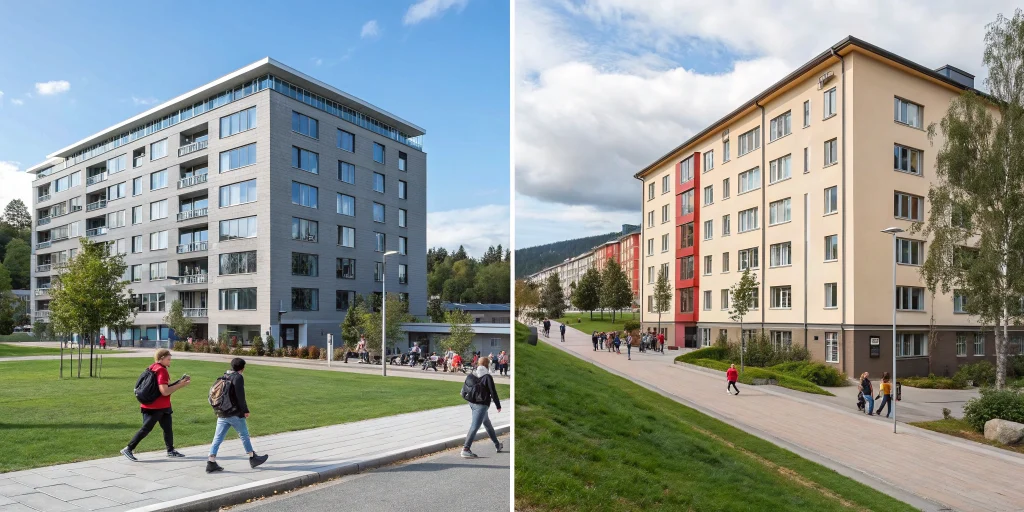Student Accommodation in Norway: Renting vs. On-Campus Housing
Understanding On-Campus Housing: Student Welfare Organisation Accommodation
Most universities in Norway provide student accommodation through student welfare organisations (known locally as “Studentsamskipnaden”), which manage dormitories, student villages, and other dedicated housing facilities tailored for students.
Key Features of On-Campus Housing
- Affordability: On-campus student housing is generally the most cost-effective accommodation available, making it an attractive option for international students on a budget.
- Community & Social Integration: These housing environments foster a strong sense of community. Students live in proximity to their peers, which promotes social interaction, cultural exchange, and mutual support.
- Accommodation Types: Typically, the housing units are single rooms with shared kitchens and bathrooms. Some locations offer small apartments or family units, accommodating diverse student needs.
- Quota and Guaranteed Housing: Universities such as BI Norwegian Business School and the Norwegian University of Science and Technology (NTNU) reserve a portion of their housing inventory specifically for international students.
- Renewable Contracts: Many on-campus agreements allow annual renewal, providing housing stability throughout the student’s academic program.
Application Process for On-Campus Housing
- Clear deadlines and quotas for international students.
- Priority given based on application timing and student category.
- Encouragement to apply early due to limited availability.
- Support services to assist international students in adjusting to life in Norway.
Private Rental Market: Renting Off-Campus in Norway
Given the limited availability of on-campus housing, many students explore the private rental market as an alternative. This market includes a variety of housing types such as flats, shared apartments, and studios in multiple locations across Norwegian cities.
Key Features of Private Rentals
- Wider Variety and Flexibility: The private market offers more extensive choices concerning housing types, sizes, and locations.
- Higher Costs: Renting privately generally incurs higher monthly rents and requires a deposit upfront.
- Competitive Process: Securing private rentals can be competitive, involving formal rental contracts and deposit negotiations.
- Early Search Recommended: Students are advised to begin their search well in advance of semester start dates.
Renting vs. On-Campus Housing: A Comparative Overview
| Feature | Student Housing (On-Campus) | Private Rental Market |
|---|---|---|
| Availability | Limited; often reserved or guaranteed for international students with quotas | More options but high competition, especially near universities |
| Cost | Generally affordable with student-friendly rates | Higher rent and additional upfront costs |
| Social Experience | Strong community focus; opportunities to network | Variable; depends on housing type and tenant mix |
| Application Process | Organised applications with deadlines and renewals | Independent search; requires contracts and deposits |
| Facilities | Single rooms; shared kitchens and bathrooms; some family units | Wide range; from shared flats to private apartments |
| Stability | Renewable contracts; stable for full study duration | Dependent on lease terms; may be less stable |
Key Considerations for International Students
Choosing between renting and on-campus housing depends on several factors:
1. Apply Early
On-campus housing is scarce and highly sought-after by international students. Early application submission is critical to maximizing the chance of securing student welfare accommodation.
2. Flexibility vs. Community
Private rentals offer flexibility in terms of location, housing type, and roommates. On-campus accommodation provides a community-oriented environment, ideal for social integration and support.
3. Budget Constraints
On-campus options are typically less expensive with fewer upfront costs, while private rentals often require a deposit equal to several months’ rent and possibly higher monthly fees.
4. Support Services
Student welfare organisations often assist with integration services, invaluable for international students dealing with language barriers or cultural adjustment. Private rentals typically involve less direct support from educational institutions.
How Study in Norway Supports International Student Accommodation Choices
As the leading platform for international studies in Norway, Study in Norway provides extensive resources on academic programs and supports international student recruitment:
- Information Dissemination: We provide accurate, up-to-date guidance on navigating the housing options available to students.
- Partnerships with Universities and Agencies: Collaboration with institutions ensures wide sharing of quota and housing guarantee information.
- Customized Support: Through targeted communication and educational content, we empower students to make informed accommodation decisions.
For HR and marketing professionals, partnering with Study in Norway means accessing a wealth of content and recruitment expertise.
Conclusion: Making the Right Housing Choice in Norway
Both renting privately and choosing on-campus housing offer viable pathways for international students:
- On-campus housing is often preferred for affordability, community, and stability.
- Private rentals suit those seeking flexibility, privacy, and a broader range of choices.
Ultimately, students’ decisions will hinge on their budget, timeline, desired lifestyle, and the effort put into seeking accommodation early.
Take the Next Step with Study in Norway
Explore further to make informed decisions about your student accommodation!

